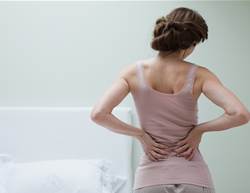Typically when we talk about having a healthy relationship with alcohol, we’re mainly concerned about “drinking responsibly.” But could that definition extend to protecting not just your immediate safety but your long-term health—including your risk for cancer? More specifically—could alcohol increase your risk for breast cancer risk?
It’s well-known that having too much to drink too often can wreak havoc on our liver, gut, and other organs; experts also say it can increase your risk of heart disease and stroke.
What’s not talked about a lot, though, according to experts, is alcohol’s connection to breast cancer.
“We know from a lot of observational-type studies that there is a link between alcohol consumption and breast cancer risk,” says women's health specialist Dr Christine Klassen. “That link seems to be very dose-dependent. So, the more alcohol that is consumed, the higher breast cancer risk would be.”
In fact, the International Agency for Research on Cancer, a division of the World Health Organization (WHO), has found that for every 10 grams of alcohol (so about a glass of wine or half a pint of beer) consumed per day, the risk of breast cancer increases by 7-10 per cent.
Now, it’s important to note that cancer is a complex, multifaceted disease that is rarely caused by one factor. In other words: It’s not like one night of overindulging at a friend’s party will directly cause a cancer scare, according to Dr Klassen.
“There are so many things that go into a person’s risk for breast cancer: family history, their personal genetic makeup, diet, and even environmental exposures,” she says.
Alcohol, she adds, is a relatively small component of that risk, but it is a risk nonetheless. Here’s how alcohol can affect your chances of getting breast cancer and what you can do to minimise the possibility.
How alcohol is linked to breast cancer
Alcohol use has been linked to seven types of cancer, including the kind that affects breast tissue. Back in 1988, the International Agency for Research on Cancer ID’d alcohol as a carcinogen or “a substance that causes cancer.”
“We’ve known that alcohol is a major influence on cancer risk for a really long time,” says obstetrician and gynecologist, Dr Blair Washington. But, exactly how alcohol affects your risk for breast cancer isn’t really understood, she adds.
Still, experts suspect there are several ways alcohol can cause harm to breast tissue:
- Alcohol and its byproducts can directly injure your DNA. After you take a sip of alcohol and it reaches your stomach, your body metabolises it and creates a toxic chemical called acetaldehyde. “This substance can accumulate in breast tissue and damage our DNA, which is the code that tells our cells how to work and grow,” says Dr Washington. “Damage to DNA can predispose people to develop breast cancer.”
- Alcohol may decrease your absorption of important nutrients. According to experts, drinking can impair your body’s ability to break down and absorb vitamins A, C, D, and E; carotenoids; and folate, all of which are nutrients that may play a role in cancer prevention.
- Alcohol may increase your oestrogen levels to harmful levels. According to Dr Klassen, oestrogen is important for the growth of breast tissue, but being exposed to high levels of this hormone for a long time may encourage the spread of oestrogen-responsive breast cancer cells, says Dr Washington.
- Alcohol may increase the cancer-stimulating hormone IGF-1, says Dr Washington. Several studies have found that too much of a certain hormone, called insulin-like growth factor-1 (which regulates the growth of your bones and tissues), can encourage cancer cell growth as well as increase breast tissue density. According to some research, breast tissue density is a strong predictor of breast cancer risk, though scientists aren’t clear on why.
What amount of alcohol is considered safe?
Experts say that there is no amount of alcohol that’s considered truly “safe” when it comes to your risk of breast cancer.
“Even women who are light drinkers, or who consume less than three drinks per week, still have an increased risk for breast cancer than those who don’t drink,” says Dr Washington. So you have an idea of what that looks like, here’s how the Department of Health defines one standard drink:
- 10g of pure alcohol
- 100ml red wine (13.5%)
- 1 mid-strength beer 375ml (3.5% alcohol)
- 30ml high-strength spirits (40%)
However, remember that alcohol and cancer have a “dose-response” relationship, she adds. This means the more you drink over the course of your life, the higher your risk of getting the disease. If you choose to drink, the Cancer Council suggests having no more than 10 standard drinks per week, and no more than 4 standard drinks on any one day.
“My general advice is that it’s not unreasonable to occasionally indulge in a few [drinks],” says Dr Klassen. “[But] for my high-risk breast cancer patients or breast cancer survivors, I typically recommend they keep it to three or fewer alcoholic beverages per week.”
Are some alcoholic beverages safer than others?
While many people have touted wine for its potential to boost heart health, and others have looked into beer’s ability to promote bone density, there is no type of alcohol that is in any way beneficial for reducing your cancer risk.
Ethanol—the type of alcohol that is associated with increasing breast cancer risk—is found in all alcoholic drinks. It doesn’t matter if it’s wine, beer, or liquor. While “weaker” drinks may seem less risky, remember that even lower amounts of ethanol can have an impact on breast cancer risk.
Who should be most concerned about alcohol and breast cancer
Everyone can be impacted by alcohol's carcinogenic effects. At the same time, there are some high-risk groups that ought to be more mindful about how much they drink and perhaps consider cutting out drinking completely, says Dr Washington. These groups include women who:
- Have a family history of breast cancer or who are themselves breast cancer survivors
- Have the BRCA1 or BCRA2 genes
- Have had hyperplasia, or overgrowth of cell tissue in the milk glands or ducts
- Or are undergoing postmenopausal oestrogen and progesterone therapy
How to minimise your risk
Alcohol is very much a part of our culture, and may well be something you enjoy. Part of the key to minimising the risks is making informed decisions. The less you drink, the less your risk of cancer. Making other lifestyle choices like eating more fruits and veggies and staying physically active may reduce the risk of getting breast cancer.
But no matter your current relationship with alcohol, it’s best to talk to your doctor about what your personal risks are so you know what adjustments you can make (if any). There’s no doubt that working together with a trusted GP can help you live a healthy life that you enjoy. Cheers to that.






.png&h=193&w=250&c=1&s=1)
.png&h=193&w=250&c=1&s=1)


